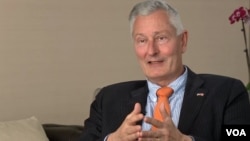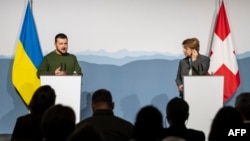Ukraine’s fight to preserve its nationhood against Russia’s invasion will soon enter its third year. Amid festering questions about how and when the war might end, and political debate at home and abroad, Switzerland’s ambassador to the United States tells VOA that he believes moral support for Ukraine is no different today than back in 2022.
“If supporting Ukraine was absolutely right as a matter of principle back in 2022, it can’t be different in 2024,” Jacques Pitteloud, a veteran Swiss diplomat, told VOA in an interview in Washington.
“As a small country geographically and in population, even if we’re a mid-sized country in terms of the economy and economic power, we will, as a people, always tend to be on the side of the victim, the smaller one,” Pitteloud told VOA.
Swiss public support for Ukraine “has not budged a lot,” he added, saying “the vast majority of the Swiss population still consider the Russian aggression as utterly unacceptable, as it goes against everything we stand for: international rules, the rule of law, respect of sovereignty, the resolution of conflict by peaceful means.”
Switzerland, the envoy told VOA, is committed to supporting Ukraine over the long haul. The Swiss government has earmarked $1.7 billion through 2028 toward helping Ukraine.
The veteran diplomat acknowledged that the war that started when Russia attacked Ukraine in February 2022 is “putting quite a strain on European economies, on energy prices.” However, the most severe strain, he emphasized, is the “unacceptable human price on the Ukrainian population.”
“At some point, people just hope for an end to the war,” as Pitteloud sees it.
Formula for peace
At the recently concluded World Economic Forum in Davos, Swiss authorities agreed to a request from Ukrainian President Volodymyr Zelenskyy to host what he termed a “peace summit.”
“One goal is to have a show of unity and send the message that war is not the solution,” the Swiss ambassador said, noting that 82 countries participated in the fourth and most recent round of talks centered on Zelenskyy’s 10-point “peace formula.”
Pitteloud told VOA that no date has yet been determined for the peace conference. It is unclear how many countries will participate in the upcoming round, but Ukraine hopes that senior national leaders could attend.
“Mr. Zelenskyy has made no secret that he would like to have this summit as soon as possible, and we will do our utmost to facilitate a meeting as soon as possible, but in the end, it’ll be up to all the participants to determine when the moment is ripe,” Pitteloud told VOA.
“It’s probably a little too early to call it a summit,” he added. “A summit is when heads of state are present, but definitely to have another meeting of as many countries as possible.”
Russia entering negotiation
Eventually, the veteran Swiss diplomat pointed out, peace talks that will bring about an end to the war will have to involve Russian representatives.
“For a real peace summit or peace conference to take place, you need the warring parties; one of the warring parties is not at the table, and that’s Russia,” Pitteloud said.
As for what might bring Russian decision maker Vladimir Putin to the negotiating table, David M. Glantz, a former U.S. Army colonel and a military historian, told VOA that internal politics could play a decisive role.
Putin has been playing a very skillful game with the multiple stakeholders constituting the Russian official system, “but there’s always a limit to what can be done,” he said.
“If Putin’s political situation deteriorated, or if his health began to deteriorate, his attitude might change,” Glantz told VOA.
If the military situation becomes more difficult for Russia, that might also cause Putin to negotiate, the Russia specialist added, noting that so far, Russian forces have dug in, as has Putin on his conditions for ending the war, including Ukraine’s non-membership in NATO and control of territories occupied by majority ethnic Russians.
‘Over by Christmas’
Asked what would incentivize the Ukrainian side to enter into negotiations with the Kremlin, Pitteloud told VOA that “It would be a sovereign decision for the Ukrainian government to assess the situation and decide how to proceed.”
Mary Glantz, a former State Department official who now serves as Senior Advisor at the U.S. Institute of Peace’s Russia and Europe Center, told VOA that the United States is also “following Ukraine’s lead on this.”
Reflecting on the duration of the war, Pitteloud said, “Everyone goes into war with the firm conviction that it would be ‘over by Christmas,’ but wars almost always go longer than people hoped.”





